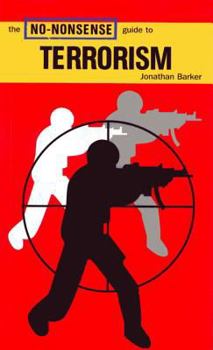The No-Nonsense Guide to Terrorism
(Part of the No-Nonsense Guides Series)
Select Format
Select Condition 
Book Overview
A highly accessible history of terrorism looking at core examples from the Middle East, instances of state terrorism and terrorist fringes of political movements. Covers the theories justifying and... This description may be from another edition of this product.
Format:Paperback
Language:English
ISBN:1859844332
ISBN13:9781859844335
Release Date:April 2003
Publisher:Verso
Length:144 Pages
Weight:0.30 lbs.
Dimensions:0.4" x 4.4" x 7.1"
Customer Reviews
2 ratings
Terrorism explained.......
Published by Thriftbooks.com User , 19 years ago
September 11, 2001 has sparked a new wave of authors as well as those who are beginning to educate themselves about terrorism. Last year I was at the Axis of Justice Tour in New York City, which featured various musicians trying to reach out to a younger crowd to get them involved in politics. The No-Nonsense Guide to Terrorism was being handed out in the parking lot on the way out of the show. At the time I had read few books on the topic and decided to embark on reading it. The general topic of this book discusses terrorism; the reasons behind it, assessing the dangers of terrorism, state terrorism and non-state terrorism, and morality of terrorism. A major downfall to this book is that all of the information has been collected as secondary data by the author. Terror in the Mind of God by Mark Juergensmeyer is an excellent book to read if you are looking for primary data collected by the author by means of interviewing people involved in terrorist activities, and visiting countries around the world where terrorists are bread. Barker did however add some of his own insight and raised some questions that were valid. Jonathan Barker is a writer and researcher from Toronto. He has taught political science at the University of Toronto, the University of Dar es Salaam, and the University of Arizona. Barker has also done research in India and Africa. Barker proposed many questions in this book but his weakness was that he used works from others to answer them, rather than answer questions on his own. The arguments were well supported by his footnotes, which showed that Barker did his research and used credible sources. The purpose of this book is to educate people on the basics of terrorism. This book is a perfect fit for someone prior to 9/11 who wants to know more about terrorists and possible motives for terrorists blowing up the World Trade Center and the Pentagon. This book will discuss instances of suicide bombings, kidnappings, targeted assassinations, and state terror, just to name a few. I would rename this book The Beginners Guide to Terrorism. It does a very good job of explaining the basics. From beginning to end, the attacks of September 11 are consistently brought up. The author seemed to make an unnecessary amount of references to September 11, especially in the first chapter. An interesting point that was made is that governments who are known to have supported death squads to eliminate and frighten opponents are guilty of terrorism themselves. Barker uses the United States as a prime example. Barker discusses the Training of Contras by the CIA in Nicaragua, the assassination of Patrice Lumumba in the Congo in 1961, and the support of Saddam Hussein to kill the Kurds. (Just to name a few) The presence of France in Algeria and the execution of thousands of Algerian men, women, and children is also discussed in great detail. Undoubtedly the most interesting part of this book is the three ideas the Barker raises about terrorism as to
Thinking about terrorism
Published by Thriftbooks.com User , 21 years ago
What a splendid and timely book this is! Without trace of pontification or gloom-mongering, Barker lays out what we need to have thought about before we can respond effectively to terrorism. As I read the book, I was struck by how widespread terrorism is in the world today and what a very long history it has in human affairs. I already knew that my ancestors had used WMD?s (smallpox infested blankets) on the indigenous peoples of North America; but I did not know that the great French celebrant of American frontier Democracy, Alexis deTocqueville, had written of his own nations? conquest of Algeria, ?In France, I have often heard people that I respect, but do not approve of, deplore burning harvests, emptying granaries, and seizing unarmed men, women, and children. As I see it, these are unfortunate necessities?. .? Terrorism is a horrific topic. Unlike many writers in this area, Barker is equal handed in his sympathy and slow to moralize. In fact he shows how moralizing often obscures the issues at stake. To design ways to oppose terrorism he prefers the metaphor of international law enforcement over the metaphor of an International War Against Terrorism. It is more likely to lead us to think practically about ameliorating the conditions that foster terrorism and less likely to allow us to depersonalize and abuse the populations from which terrorists arise. Above all, the book helps you advance your own thinking on this fraught subject. Barker?s book is one of the No-Nonsense Guides, which originate from a Candian Publisher, Between the Lines. These are a series of thoughtful, succinct works on the most thorny issues of modern life, ranging from climate modification, to world trade, to world history. They are pocket books in the old fashioned sense of books you carry with you on the subway, to the dentist office, to the kids? hockey game that are so interesting and well-organized that you keep your place between interruptions. I applaud both the series and the volume.






